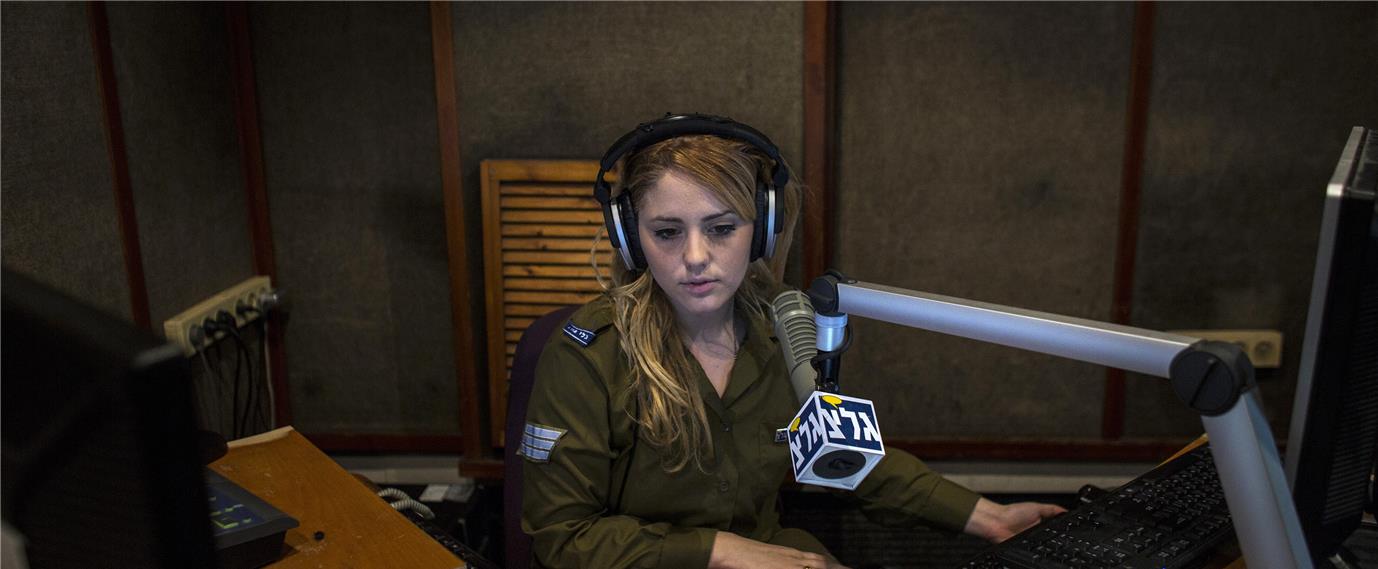يحاول الاحتلال الإسرائيلي تسخير كافة إمكانياته لاختراق المجتمع الفلسطيني، لعكس وجهة النظر "الإسرائيلية"، وآليات الدفاع عنها. ورغم أنه يجد في مواقع التواصل الاجتماعي طريقة ناجحة للتقرب من الفلسطينيين والتغلغل في المجتمع لزيادة النفوذ "الإسرائيلي" في الضفة الغربية وقطاع غزة، فإنه يستخدم وسائل الإعلام الأخرى التي يجد فيها وصولاً جيداً في المجتمع الفلسطيني؛ كالإذاعات المحلية التي يمكنها الدخول إلى كل بيت وسيارة ومقهى.
دشن الاحتلال الإسرائيلي عام 2015 صفحة على فيسبوك باسم "المنسق" يديرها منسّق أنشطة الحكومة الإسرائيليّة في الأراضي الفلسطينيّة التابع لوزارة الدفاع، حيث يحاول من خلالها "التواصل الإنساني" مع الفلسطينيين بذريعة تقديم الخدمات وتسهيل تنقلهم عبر المعابر التي يسيطر عليها الاحتلال، وتقديم النصائح والإرشادات. وتظهر هذه الصفحة لكافة الفلسطينيين بواسطة الإعلان الممول.
وباستمرار يظهر منسق أنشطة حكومة الاحتلال الجنرال كميل أبو ركن الذي يتقن اللغة العربية الفصحى، في مقاطع مصورة على صفحة "المنسق"، متحدثاً عن التسهيلات التي يمكن تقديمها للفلسطينيين، ويدعوهم إلى التعايش السلمي مع "الإسرائيليين".
ولم تقتصر أنشطة المنسق الإسرائيلي على بث المقاطع المصورة عبر صفحته الخاصة على فيسبوك، ففي 20 ديسمبر/كانون الأول 2018 كانت انطلاقةالبث الأول لراديو "المنسّق" على الإنترنت، وهي وسيلة جديدة للتواصل مع الفلسطينيّين، يوم الخميس من كل أسبوع.
تبث "إذاعة المنسق" برامج لعرض المشاكل التي يعاني منها الفلسطينيون وإيجاد حلول لها، من خلال البث الذي يستمر على مدار الساعة. أما في الأسابيع الأولى من افتتاحها فقد اكتفت ببث الأغاني العربية القديمة كأغاني صباح فخري وعبد الحليم حافظ وأم كلثوم على مدار أربعة أسابيع.
ملامسة الحياة اليومية
ورغم أن "إذاعة المنسق" الإلكترونية حديثة النشأة، فإنها مشابهة للإذاعة الإسرائيلية الناطقة باللغة العربية التي أطلقت في ثمانينيات القرن الماضي، وكانت تبث برامج قريبة من الجمهور العربي وتقدم لهم حلولاً في كافة القضايا التي تلامس حياتهم اليومية، حيث كان لها جمهور واسع من الفلسطينيين في الضفة الغربية وقطاع غزة والقدس المحتلة.
وتعد "إذاعة المنسق" إحدى الوسائل الحديثة التي يستخدمها الاحتلال الإسرائيلي للوصول إلى الفلسطينيين والتواصل معهم والتأثير عليهم، حيث يتمكن الفلسطينيون من استخدام شبكة الإنترنت عند الحواجز، وفي صالات الانتظار في المعابر التي يسيطر عليها الاحتلال.
وكرد فعل مضاد، حذّر موقع "المجد" الأمني المقرب من كتائب القسام -الجناح العسكري لحركة حماس- من التعاطي مع هذه الإذاعة والاتصال على الأرقام المجانية، لكونها تخدم سياسة الاحتلال الإسرائيلي، وتهدف إلى استغلال الفلسطينيين.
التغلغل في المجتمع الفلسطيني
وفي هذا السياق يقول عميد كلية الإعلام بجامعة القدس المفتوحة في غزة الدكتور حسين سعد لمجلة "الصحافة" إن "الاحتلال الإسرائيلي يسعى من خلال تدشين إذاعة المنسق إلى مخاطبة المجتمع الفلسطيني بأضعف حالاته، في ظل الأوضاع الاقتصادية التي يمر بها. ومن خلال هذه البرامج والمواد الصحفية المنتقاة، يستطيع التغلغل في المجتمع الفلسطيني، فهذه الإذاعة تعمل وفق أجندة أمنية، وتتركز أعمالها على إسقاط الفلسطينيين وتجنيد العملاء".
ويضيف أن "المجتمع الفلسطيني في ظل الحالة التي يعيشها سوف يتجاوب مع البرامج التي تبثها هذه الإذاعة، لكونها تستهدفهم بشكل مباشر، وتقدم لهم خدمة الاتصال المجاني والبرامج التي تعالج القضايا المجتمعية التي يعانون منها، فهناك نسبة كبيرة جداً من الفلسطينيين يتابعون الأخبار الإسرائيلية ويتجاوبون معها، في ظل عدم تطرق وسائل الإعلام المحلية إلى هذه القضايا وانشغالها بالتراشق الإعلامي".
وشدد الدكتور سعد على أن الصحفيين ونشطاء التواصل الاجتماعي يعتمدون بشكل كبير على الأخبار المنشورة على المواقع الإسرائيلية الناطقة باللغة العربية، وهذا يعني أن المجتمع الفلسطيني متابع ومستهلك بشكل كبير للإعلام العبري، وينشر الأخبار والمعلومات دون التأكد من مدى مصداقيتها، فهم أصبحوا أداة لتوصيل الرسالة الإعلامية الإسرائيلية إلى المجتمع الفلسطيني بدون مقابل وبدون وعي.
إيجاد بدائل
يؤكد سعد على ضرورة التوعية الإعلامية في المجتمع الفلسطيني، وإيجاد بدائل قوية للإعلام الإسرائيلي، وبث حملات توعية عبر الإذاعات والفضائيات المحلية، إضافة إلى توعية النشطاء والإعلاميين الذين يتابعون الأخبار الواردة من وسائل الإعلام الإسرائيلية، ويتولّون نشرها دون تدقيق بهدف السبق الصحفي والسرعة في نقل الأخبار.
ويقول الصحفي الفلسطيني والمتابع للصحافة الإسرائيلية محمد جربوع في حديثه لمجلة "الصحافة" إن "الاحتلال الإسرائيلي يسعى بشتى الطرق إلى التأثير في المجتمع الفلسطيني، بالتزامن مع مسيرات العودة والأحداث الأخيرة. وتعد الإذاعة من أقدم وسائل الإعلام وأكثرها تأثيراً ووصولاً إلى المواطنين بكافة شرائحهم، في حين تجد قراء الصحف الورقية والإلكترونية من المثقفين والقراء غالباً".
ويضيف أن "إذاعة المنسق محاولة للتقرب من الفلسطينيين، فبث الأغاني المحببة لدى المجتمع الفلسطيني مثل أم كلثوم وصباح فخري، ومناقشة المشاكل الاجتماعية والسياسية التي يعاني منها الفلسطينيون، ستعود بالإيجاب على الإذاعة وبالسلب على المجتمع الفلسطيني، وستزيد من شعبية هذه الإذاعة لملامستها احتياجاتهم".
نظام مجاني
يقول الصحفي جربوع إن "المواطن الفلسطيني يفضل المشاركة المجانية، والإذاعات المحلية تفرض الرسوم على الاتصال للمشاركة في البرامج اليومية التي تبثها لحل المشاكل التي تطرحها تلك البرامج؛ ولكن إذاعة المنسق تتيح للمستمعين الاتصال مجاناً، لمساعدتهم في حل القضايا التي تطرحها من خلال برامجها، الأمر الذي سيزيد من أعداد المتابعين، وسيكون لها تأثير على المجتمع الفلسطيني في الفترة الحالية والفترات القادمة".
ويعزو جربوع سبب إنشاء الإذاعة الإسرائيلية الجديدة إلى إدراك المنسق الإسرائيلي سهولة وصوله من خلال هذه الإذاعة إلى أكبر عدد من الفلسطينيين، خاصة رواد المقاهي الشعبية وسائقي التاكسي وكبار السن، فالإذاعة في قطاع غزة والضفة الغربية تحظى بمتابعة واسعة رغم وجود ما يزيد عن 60 إذاعة محلية.
ويلفت إلى أن ما يجعل لإذاعة "المنسق" أهمية كبيرة لدى الاحتلال الإسرائيلي، أن الفلسطينيين يهتمون كثيراً بالإذاعات المحلية، وتشكل بالنسبة لهم مصدرا فعالا وسريعا للحصول على المعلومات، كما تُعد المحور الرئيسي لتشكيل الوعي لديهم، بصرف النظر عن التطور الإلكتروني وانتشار التطبيقات والبرامج المتنوعة.
توعية
ويرى جربوع أنه من الضروري توعية المواطن الفلسطيني من مخاطر هذه الإذاعة والمشاكل التي ستظهر على الفلسطينيين، خاصة سكان قطاع غزة، كما فعلت إذاعة "كان" الإسرائيلية التي حظيت باهتمام كبير من المواطن الفلسطيني، وهي الآن تبث الأخبار الكاذبة والإشاعات، خاصة بعد الأحداث الجارية على حدود غزة.
ويرى الخبير في الشأن الإسرائيلي الدكتور مأمون أبو عامر "أن الاحتلال الإسرائيلي يسعى للتواصل مع السكان المحليين في قطاع غزة والضفة الغربية، لدافع استخباراتي ومعرفة نقاط الضعف والقوة لديهم، ومعرفة إمكانيات التواصل مع الأشخاص للحصول على معلومات أمنية عن الأمور الفلسطينية غير المعروفة لدى الاحتلال".
ويقول أبو عامر في حديثه لمجلة "الصحافة" إن "إذاعة المنسق بوابة جديدة يسعى الاحتلال الإسرائيلي من خلالها إلى جمع المعلومات وتوجيه الرأي العام الفلسطيني، ونشر الأخبار لتعميق الخلاف بين حركتي فتح وحماس، فهناك أطراف يتابعون الأخبار التي ينشرها الإعلام الإسرائيلي الناطق باللغة بالعربية على أنها موثوقة، ويتم تداولها بينهم، وهذا ما يزيد إصرار الإسرائيليين على ابتكار وسائل إعلامية جديدة".
البوابة الإنسانية
ويضيف أبو عامر أن "الاحتلال أراد الدخول والتغلغل في المجتمع الفلسطيني من البوابة الإنسانية لاستغلال الأوضاع الراهنة التي يعيشها الفلسطينيون، وهي محاولة لإغراء المواطن الفلسطيني بأن بإمكانه السفر عبر المعابر التي يسيطر عليها الاحتلال مقابل إدلاء معلومات، وهي قوة إرغام ولكن بشكل غير مباشر، وربط الناس بحاجاتهم مع الاحتلال".
ويتابع أن "إذاعة المنسق" قد تؤثر على فئات معينة من المجتمع الفلسطيني من أصحاب الحاجات ومن وصفهم "بالجهلاء"، ولكن بنسبة ضعيفة، بسبب "وجود تيار وطني ومقاومة فلسطينية، وهذا يضعف دورها ولا يلغيه". وعليه فإن هذه الإذاعة قد تُسقط بعض الأشخاص، وتروج لبعض الأفكار المضللة حول المجتمع الفلسطيني.








































